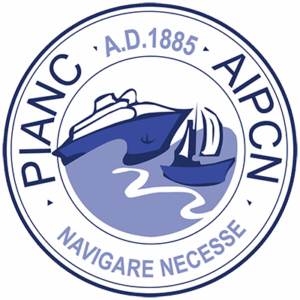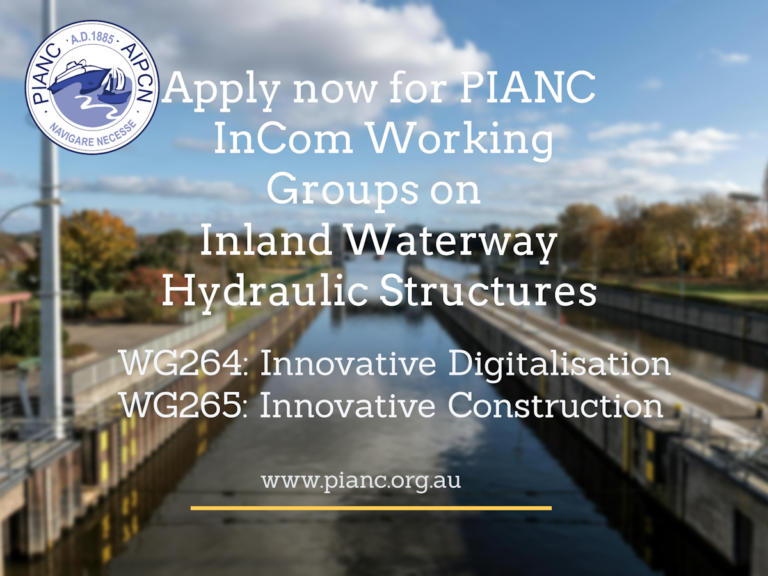PIANC International Call for members for InCom WG264 Innovative Digitalisation Approaches for Managing Hydraulic Structures of Inland Waterways &
WG265 Innovative Construction Methods of Inland Waterways Hydraulic Structures.
Apply to PIANC AU-NZ Board by COB Friday 13 December. (see below for details)
1)WG 264 Innovative Digitalisation Approaches for Managing Hydraulic Structures of Inland Waterways.
The primary objectives of the working group are to identify and document best practices and innovative digitalisation solutions in the management and maintenance of inland waterway hydraulic structures on an international scale. Examples of successful and efficient use of digital data will be compiled.
Digital solutions will include for example digital object registers to catalogue and manage information about hydraulic structures, or solutions for technical document management related to maintenance, or inspections and repair processes. It will be crucial to differentiate these solutions based on their stage of development, whether they are conceptual, prototypical, or fully implemented. Moreover, the working group aims to address the following: Data storage & Quality: Data need & data access: Data update & Data capture:
The working group seeks to advance understanding and promote effective digitalisation initiatives in the context of information management within the field of hydraulic structures of Port & IWs. Additionally, it aims to offer actionable recommendations for stakeholders in waterway management.
More information is here in the WG264 Terms of Reference.
2) WG 265 Innovative Construction Methods of Inland Waterways Hydraulic Structures.
To develop innovation in IW, the two main objectives of the working group are:
− to make recommendations about innovation promotion and management, and
− to suggest ideas and technical considerations about possible innovations.
The scope of work includes IW works (related to locks, weirs, banks) such as building, design, specific uses of new material, operating, maintenance, refurbishment, retrofitting under operation, … It does NOT include traffic, navigation, boats and river management.
To be successful in innovation, it is not sufficient to have a relevant technical idea, but it is necessary to manage it correctly from the preliminary steps of fostering and promotion to the operational steps of design, risk assessment, contracting and construction.
Two parts will be considered in the WG report:
A/ Strategies and Methods to develop and manage innovation.
B/ Technical and practical aspects (new ideas and concepts).
The final product will be a report with recommendations, including operational methods and examples of innovative concepts and projects.
More information is here in the WG265 Terms of Reference.
Interested in being part of an International Working Group?
If you would like to represent the Australian & New Zealand National Section of PIANC on this Working Group, please apply to the AU-NZ Board. Many of our members are currently active on a number of PIANC Working Groups and they produce significant outcomes that benefit maritime matters in our region. They also bring significant benefits to participants who get to meet, learn from and share with global experts.
Please advise if you qualify as a Young Professional (YP – 40 years or younger) as there are two positions available in each Working Group, one of which is for a YP.
How to Apply
Please forward your application/s before COB Friday 13 December 2024 to:
Apply to Greg Britton, (Technical Commission Lead AU-NZ) E: greg.britton@rhdhv.com, and please also cc Paul Weston, EO for PIANC AU-NZ E: Paul.weston@pianc.org.au
Process for Applications
Your application should include a detailed CV/Resume with a short covering letter outlining:
1. Your experience in the particular technical field;
2. Why the WG is relevant for the Australian / NZ content and the direct benefits of participation;
3. A commitment that you will prepare (for distribution to all members) a short report providing an overview & outcomes of the WG etc;
4. Whether or not you are seeking to access Travel Assistance Policy (TAP )funding; and
5. Whether you qualify as a Young Professional.
Eligibility:
Please note that Working Group Members need to be Individual Members of PIANC, working for a Corporate Member or Platinum Partner, be an invited expert or a be a member of a Sister Organisation.
Process:
A Selection Committee will review all nominations received and make a final recommendation to the PIANC AU-NZ Chair.
Responsibilities:
Please be aware that membership of a Working Group does require your active participation. This includes attending Working Group meetings (pre-Covid -19 this was usually at international locations) or as a ‘Corresponding Member’ if you do not want to undertake the normal travel requirements of full membership. If you are expert in the field and would like to influence the outcome of the Working Group we encourage you to participate as fully as you are able.
Costs:
All costs associated with membership must be borne by either yourself or your employer, however PIANC Australia & New Zealand has a Travel Assistance Policy to partially assist with travel & attendance at Working Group meetings, in order to promote Australian and New Zealand technical input into these important WG activities.
Under the PIANC AU-NZ Travel Assistance Policy (TAP), up to $2,000 funds may be payable post travel upon the successful completion of a WG Summary Report and production of relevant travel receipts.

